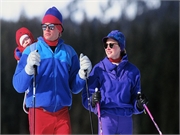Snow Blindness a Wintry Danger

SUNDAY, Dec. 15, 2019 (HealthDay News) -- With the arrival of winter, it's time for skiing, sledding and ice skating, but it's also when snow blindness can strike.
Snow blindness is like a sunburn in the eyes. It's caused by the same UV rays that give you that summer tan. In the case of snow blindness, the rays are reflected off the snow and into your eyes, explained experts from Ohio State University's Wexner Medical Center.
The cornea is the outer dome of the eye. It is covered by a thin layer of cells called the epithelial layer. UV light can burn this layer just as it burns your skin.
UV burns to the cornea are called photokeratitis. Inflammation of the epithelial layer can result in blurred vision. When this happens after being outside on a bright snowy day, it is commonly referred to as snow blindness.
Snow blindness can cause your eyes to feel burning, itching, stinging or intense pain. The same condition can result from being on the water or a beach as UV rays are reflected off the water or sand.
Photokeratitis can also occur at high elevations where less UV light is absorbed by the atmosphere, the experts noted in a medical center news release.
The best way to protect yourself is to use UV-light protective eyewear, the Ohio State team said. This can be either sunglasses or snow goggles.
The label should read: "Blocks 100% UV-A and UV-B," or "UV400."
If you think you have snow blindness, first get out of the sun. Next, see an eye doctor, the team advised.
Photokeratitis usually goes away by itself in a couple of days. Until it does, stay out of the sun. Also, don't wear contact lens, they added.
Common treatments include artificial tears, cool compresses and over-the-counter painkillers. In addition, don't use a tanning bed without protective goggles and always wear eye protection when welding.
More information
For more on photokeratitis, head to the American Academy of Ophthalmology.

The news stories provided in Health News and our Health-E News Newsletter are a service of the nationally syndicated HealthDay® news and information company. Stories refer to national trends and breaking health news, and are not necessarily indicative of or always supported by our facility and providers. This information is provided for informational and educational purposes only, and is not intended to be a substitute for medical advice, diagnosis, or treatment.

